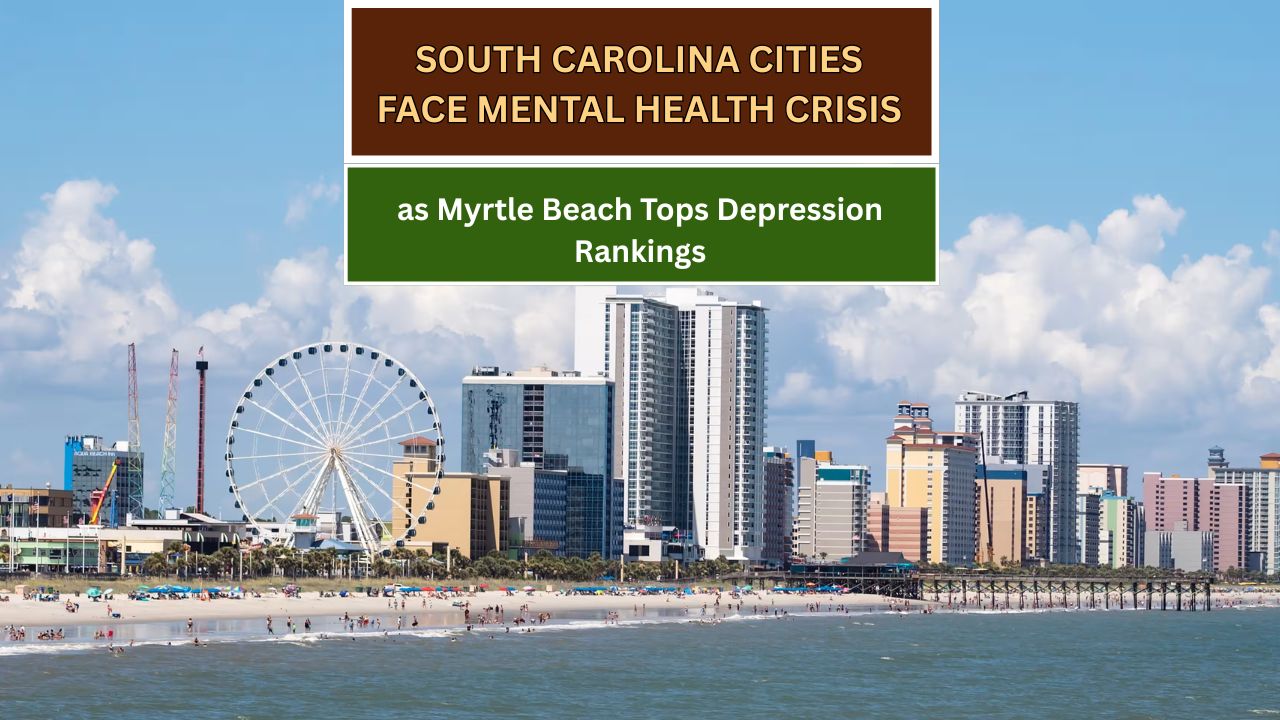Myrtle Beach, South Carolina, known for its sandy beaches and vibrant tourism, has been ranked the most depressed city in the state. This surprising designation comes from a study by CEUfast, which analyzed depression rates across the U.S. using data from the Centers for Disease Control and Prevention (CDC). The findings shed light on a serious public health challenge not only for Myrtle Beach but for South Carolina as a whole.
One in Five Residents Live with Depression
According to the CEUfast study, approximately 22.9% of adults in Myrtle Beach have been diagnosed with clinical depression. This makes it one of the top 30 most depressed metro areas in the United States.
To put this into perspective, the statewide rate of depression in South Carolina is 21.9%, based on data from America’s Health Rankings, a project backed by United Health Foundation.
These figures mean that nearly 1 in 5 South Carolinians are living with some form of diagnosed depression. For Myrtle Beach, the percentage is even higher, raising concerns among mental health professionals and public health officials.
Why Myrtle Beach? Factors Behind the High Depression Rates
Though the region is a tourism hotspot, year-round residents face challenges that may not be visible to the casual visitor. The CEUfast report and supporting data highlight a few contributing factors:
- Seasonal Employment: A large portion of the job market is dependent on tourism, which means many workers face unstable, part-time, or seasonal employment. This economic uncertainty contributes to stress and emotional distress.
- Low Wages and High Cost of Living: While tourism brings revenue to the area, many residents struggle with low wages and rising housing costs. Economic stress has long been associated with mental health conditions, particularly depression.
- Social Isolation: Myrtle Beach has a relatively high number of retirees and transient residents, which can lead to fewer stable social connections — a known risk factor for mental health issues.
Statewide Mental Health Challenges
Zooming out to look at the state level, South Carolina faces a broader mental health crisis. According to the National Alliance on Mental Illness (NAMI) South Carolina, the state has over 2.3 million residents living in areas designated as Mental Health Professional Shortage Areas.
This shortage means that even those who are willing to seek help may not be able to access it. There are simply not enough licensed mental health providers to meet the demand.
NAMI also reports that:
- Nearly 40% of South Carolinian adults with a mental illness receive no treatment at all.
- South Carolina ranks 40th in the nation for access to mental health care, despite growing awareness and advocacy.
Sumter: Another City Struggling
While Myrtle Beach holds the unfortunate title for highest depression rates, another South Carolina city, Sumter, has been identified as one of the most miserable cities in the United States. According to an article by iHeart, Sumter struggles with high unemployment, low household income, and a poverty rate exceeding 20%.
These social and economic factors are closely tied to mental health outcomes. While the study didn’t list Sumter among the most clinically depressed cities, its economic indicators suggest a high risk for mental illness among its population.
A Call for Mental Health Reform in South Carolina
The numbers coming out of cities like Myrtle Beach and Sumter underscore an urgent need for action. Mental health organizations are calling on the state government to:
- Expand funding for mental health services.
- Recruit and retain more mental health professionals in underserved areas.
- Implement school and community-based mental health programs.
If you or someone you know is struggling with depression in South Carolina, the South Carolina Department of Mental Health offers resources and a crisis helpline.
Conclusion
The title of “most depressed city” may not be what residents of Myrtle Beach want to hear — but acknowledging the problem is the first step toward addressing it. While its sunny beaches attract millions of visitors, many locals face silent struggles. With coordinated effort and greater public investment, South Carolina can begin to close its mental health care gaps and offer hope to communities in need.
This article has been carefully fact-checked by our editorial team to ensure accuracy and eliminate any misleading information. We are committed to maintaining the highest standards of integrity in our content.

Outside of work, he enjoys playing chess, following cricket, and writing short stories. His commitment to integrity and in-depth analysis strengthens OTE News’ mission of providing trustworthy journalism.




